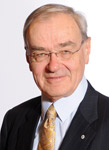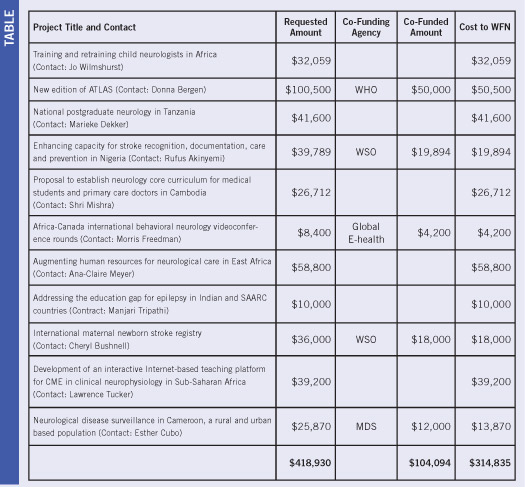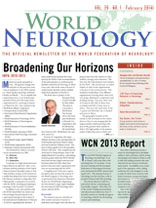By Vladimir Hachinski

Vladimir Hachinski
Missions set goals and guide actions. The greatest change that took place in the past four years was an expansion of the WFN mission to “foster quality neurology and brain health worldwide.” To accomplish this required partners, so we invited representatives from all of the major brain organizations for a meeting in Geneva on March 30, 2011, that resulted in the World Brain Alliance composed of:
- European Brain Council (EBC)
- International Brain Research Organization (IBRO)
- World Federation of Neurology (WFN)
- World Federation of Neurosurgeons (WFNS)
- World Federation of Neurorehabilitation (WFNR)
- World Psychiatry Association (WPA)
- International Child Neurology Association (ICNA)
- International League Against Epilepsy (ILAE)
- World Stroke Organization (WSO)
- Alzheimer’s Disease International (ADI)
The World Brain Alliance activities can be summarized as an ABC.
A = Advocacy
B = Brain Year
C = Cooperation
I took part in a high ministerial meeting in Moscow in April 2011, then a consultation with the president of the United Nations General Assembly in June in New York and then a session of the General Assembly that adopted the Non-Communicable Diseases resolution in September 2011. Subsequently, I continued to be involved with the WHO, including participating in meetings of the Executive Committee.
In addition to my own activities with the WHO, Raad Shakir has chaired and Donna Bergen has participated in the expert panel advising on the revision of the International Classification of Diseases 10 (ICD10) regarding brain disorders. A major achievement has been the acceptance by the WHO of the recommendation of the subcommittee on cerebrovascular disorders chaired by Bo Norrving, of which I was a part, that stroke cease to be part of cardiovascular disorders and be classified under brain disorders in the ICD-11.
The Brain Year is a project of the European Brain Council, led ably by Mary Baker. The intent is to proclaim a World Brain Year Europe 2014 at the European Parliament in Brussels. It is hoped that it will be followed by the World Brain Year Americas 2015, World Brain Year Asia 2016, and so on.
In terms of cooperation, the major initiative has been in the neurospecialty network founded and led by Werner Hacke, and now headed by William Carroll. This aims to bring together all of the specialties related to the brain. This complements the work done by Donna Bergen, chair of the Applied Research Committee, rationalizing research groups within the WFN whereby some have become largely irrelevant and have been dissolved while others have grown to become major organizations that now are reconnecting with the WFN.
A tangible proof of the new cooperative spirit is that several of the sessions of the World Congress of Neurology were co-sponsored by the Movement Disorders Society, the World Stroke Organization, the International League Against Epilepsy, the International Child Neurology and a session with the WHO.
Grassroots
We initiated a process whereby we offer modest amounts of money to individual neurologists who had ideas for projects that meet the criteria of value, viability, synergy and evaluation. The first year all of the projects were funded by the WFN. The second year, we asked leaders of other brain organizations to be part of the review process. This resulted in leadership of the different organizations learning about what each was doing, allowing for cooperation and avoiding overlap. Last year, there were 10 Grants-in-Aid, half of them were co-funded and half of them were in Africa. This year, the total value of the 11 grants was $419,000, five co-funded and seven in Africa.
The geographic location of the Grants-in-Aid was based on the criteria alone so that it is encouraging that the largest number ended up being in the area of the greatest need, namely in Africa. The high quality of the projects makes it likely that some of them will produce enough pilot data to allow for applications to larger funding agencies such as the Fogarty Foundation.
Public Awareness and Action Committee
The Public Awareness and Action Committee headed by Mohamed Wasay is trying to establish a World Brain Day inspired by the highly successful World Stroke Day, that I proclaimed when I was vice president of the WFN in Cape Town on Oct. 29, 2006, along with a World Stroke Agenda to which all of the major organizations dealing with stroke contributed.
Publications
During this administration at the recommendation of the Publications Committee, chaired by Christopher Kennard, a new editor was selected for the Journal of Neurological Sciences. Robert Lisak who served as editor for 15 years steadily increased the journal’s impact factor and circulation for which the WFN is immensely grateful. He was succeeded by John England who has co-opted highly capable associate editors in the areas of global neurology, translation research, outcomes research and practice standards that will give the journal a distinctive personality and a higher profile.
World Neurology is now totally digital, being capably edited by Donald Silberberg. World Neurology is in dynamic interaction with the website that has been modernized, updated and made more useful under the editorship of Pete Engel and with the gifted technical capabilities of Chu Man. Wolfgang Grisold has been active in the website in close coordination with the activities of the Education Committee.
World Neurology Congresses: Accelerating the Cycle
As vice president, I initiated the process that resulted in moving the World Congresses from a four-year cycle to a two-year cycle. This has allowed for neurology to go where it is most needed. The main aim of congresses is to take neurology to parts of the world where it becomes accessible to neurologists and others interested in the nervous system who have no means of traveling internationally. The more frequent congresses also have allowed continuity in organization and the scientific program committee and have brought in more frequent income in an era of shrinking resources.
Finance
Our finances are sound, thanks to our able Secretary-General Raad Shakir and proceeds from a combination of successful congresses and sound investments. Our expanded activities also have required that we revamp the budgeting process, and we have implemented management accounting, whereby it is possible to monitor our income and expenditures on an ongoing basis that will allow for easier planning in the future.
The Standards and Evaluation Committee
As part of our expanded mission, we established standards, so that anything endorsed by the WFN stands for quality and value. This began as a working group headed by Aksel Siva, aided by Sarosh Katrak, and initially by Charles Warlow and later by Werner Hacke and has now been established as a new committee of the WFN. The higher standards have made the WFN’s endorsements more valuable.
Continental Initiatives
 Africa: My predecessor, President Johan Aarli made it his mission to do more with Africa, the continent in the greatest need of neurology.
Africa: My predecessor, President Johan Aarli made it his mission to do more with Africa, the continent in the greatest need of neurology.
It was at his behest that the first congress on the African continent took place in Marrakesh in 2011. Our Moroccan colleagues, led by Moustafa El Aloui, not only hosted an exemplary congress, but used the proceeds from the congress to establish a foundation to further neurological endeavors. Similarly, the WFN devoted part of its income to be used in Africa.
The WFN has been a participant of the annual neurology courses in Africa along with European Federation of Neurological Societies (EFNS), International Brain Research Organization and others. The training neurology center in Rabat has now been approved by the WFN, and discussions are under way with colleagues in Ghana and Tanzania for the possibility of setting up a training program in an English-speaking African country.
At the initiative and with funding from the Turkish Neurological Society, a program for visiting trainees has been established between Turkey and East Africa.
The high proportion of grassroots grants funded in Africa reflects both the great need and great opportunities to advance neurology in Africa.
Asia: We began the Asia Initiative led by Ryuji Kaji with modest help from the WFN, helping organize an infrastructure for the now thriving Asian Oceanian Association of Neurology.
Latin America: The formation of a Latin American initiative led by Gustavo Roman resulted in the Latin American Federation of Neurological Societies and in the democratic election of a regional director: Marco Medina.
Regarding the established continental regional neurological societies, namely the North American region (Canada and the United States) and the European Federation of Neurological Societies, our administration made a point of having good and direct relationships with them. Specifically, we initiated an annual meeting of the leaders of the WFN and the AAN (Berch Griggs, Bruce Sigsbee, Timothy Pedley and Cathy Rydell) that has fostered better understanding and greater cooperation between the two organizations. Similarly, it has been a pleasure to deal with the president of the EFNS, Richard Hughes, who was most cooperative in co-sponsoring the World Congress of Neurology in Vienna and in dealing with matters of mutual interest.
Education Committee
The single largest activity of the WFN is directed by the Education Committee. It has been led in an exemplary, complementary way by Stephen Sergay and Wolfgang Grisold who have organized, rationalized and focused the efforts of the Education Committee. Some of their achievements include the accreditation visits to training programs such as the one in Trujillo, Peru, and the activities reported under the Africa Initiative.
The WFN: An Organization for All Ages and Career Stages
As vice president, I facilitated the incorporation of a young neurologists group led by Walter Struhal with the aim of making the WFN an organization for all ages and career stages. I am happy to report that there has been a considerable expansion in the participation of younger neurologists, particularly in regard to the website and using modern technology for communication and education. We also introduced a discount on the congress registration for senior neurologists in an attempt to make the World Congress of Neurology attractive and affordable throughout a full career span.
Leadership Training
Although the administration was elected for a four-year term, we divided it into two halves. For the initial two years, the committees and initiatives were kept small so that the member could get to know each other and learn to work together. For the second two years, the committees and initiatives were expanded and a number of vice chairs were appointed, typically younger individuals, more women and more individuals from different parts of the world. The two-year cycle gives opportunities for promotion to the most active individuals and the possibility of being involved in different committees and initiatives in sequence.
Conclusion
It is not for me to judge what we have achieved, except that it resulted from a collective effort.
I would like to thank Vice President Hacke, Secretary-General Raad Shakir, and fellow Trustees, Donna Bergen, Wolfgang Grisold, Ryuji Kaji, Gustavo Roman and Stephen Sergay, in the central office, Keith Newton, Laura Druce and Helen Gallagher and in my office, Rebecca Clarke and the many around the world who know that they have made a difference.
I am particularly grateful to our Austrian colleagues under the leadership of the World Congress of Neurology, Eduard Auff who hosted a magnificent event. It would be hard to imagine a more splendid congress to culminate my presidency. I was especially privileged to have my Dream Waltz (orchestrated by Jason Stanford) premiered at the Musikverein as part of the Gala Concert. It is not too often that one can say that one’s presidency ended literally on a high note.
I congratulate President-Elect Raad Shakir, Vice President-Elect William Carroll, Secretary-General-Elect Wolfgang Grisold, elected Trustee Gallo Diop and continuing elected Trustee Gustavo Roman and wish them every success in fulfilling the mission of the WFN to “foster quality neurology and brain health worldwide.”
